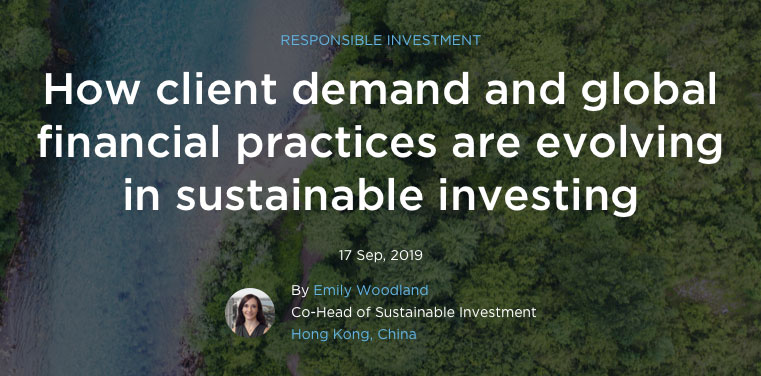
How client demand and global financial practices are evolving in sustainable investing
– AMP Capital
Dubbed the “world’s best plan”, the SDGs are targeting a better future through decisive action on the most urgent global issues. The surpassing scale of this mission calls for $5-$7 trillion of investment per year until 2030 and has catalysed leaps in sustainable investing worldwide.
Global client demand in sustainable investing has evolved considerably and rapidly over recent years, but it is not the same everywhere. The current state varies significantly across geographies. One country that has recently been rapidly integrating ESG principles – the consideration of non-monetary risks and opportunities – into its financial practices, is Japan.
Japan charges ahead
Japan is navigating a recovery from its 1992 economic crash and subsequent ‘lost decade’. Now in its sixth year, the Japan Revitalisation Strategy is the “third arrow” of its Abenomics program and it is being helped by fresh SDG-inspired thinking about long-term sustainable value creation.
Speaking to a Tokyo Stock Exchange-hosted meeting of the global corporate governance community, Shinzo Abe addressed the role of responsible investing to help meet the most important developments and challenges shaping the future.
Perhaps the most compelling example of leadership is Japan’s Government Pension Investment Fund (GPIF). Its first action towards the SDGs was to resolve in 2017 that 10 per cent of its equity portfolio be managed under ESG mandates. With diversification as its primary investment strategy – by asset class, region and timeframe – and in excess of $1.4 trillion in AUM, the knock-on effects have been significant.
What we are seeing – and will continue to see – is the development of new product offerings and strategies across multiple asset classes, the bolstering of existing offerings with stronger sustainability credentials, and increased sophistication with which non-financial performance is evidenced.
Five key stages of client demand
Investors have witnessed numerous examples of how poor ESG management can result in sudden shocks to the downside and prolonged underperformance. Many are now beginning to appreciate that these considerations are integral to protecting portfolio value as well as presenting a potential opportunity.
AMP Capital observes five stages of client demand occurring in the sustainable investment universe: negative screening; holistic ESG integration; engagement and accountability; reporting; and thematic and impact investing.
First, simple negative screening based on ethical grounds has been around in various forms for decades, however the number and scope of issues being screened out is now broadening. It is the mainstay in regions where the investment community is still at the earlier stage of their ESG journey.
The second stage addresses the more holistic question of how material ESG factors affect investment risks and opportunities, and their effect upon long-term intangible drivers of company value. Some of the most common examples considered are climate change, modern slavery in supply chains, remuneration and diversity, among others.
The third involves engaging with companies and holding them accountable for their actions. Asset owners are increasingly appreciating the power of financial capital to effect long-term change. Rather than simply divesting of undesirables, which is a rather blunt tool, investors are increasingly leveraging their voting influence, undertaking direct dialogue and shareholder resolutions with companies, and demanding comprehensive action and transparency from their investment managers. We are likely to see rising demands for transparency and proactivity on proxy voting and engagement, both from our clients and also regulators. The current consultation underway by the FSC in Australia to expand its Standard 13 on Voting Policy, Voting Record and Disclosure is an example of this.
The fourth trend now on the rise is that clients are increasingly requesting evidence of non-financial outcomes as well as financial ones. This is not limited to carbon footprint, which is by now relatively common. Europe is at a more advanced stage with this – having issued a directive to standardise non-monetary impact reporting through the development of its taxonomy. The question of frameworks to converge financial and non-financial reporting is gaining traction through the likes of the Sustainable Stock Exchanges Initiative, the International Accounting Standards Board (IASB) and efforts by the GIIN’s IRIS, GIIRS by B-Analytics and the Impact Management Project, among others. Many are also turning to the SDGs in an attempt to establish a common language in evidencing non-monetary impact.
The fifth and final iteration underway is to more intentionally target the positive outcomes inherent in the global changes arising. Facing an increasingly constrained future, companies whose business models capitalise on systemic trends and offer positive solutions to global sustainability challenges may present investment opportunities and structural pathways to growth. Clients are seeking investment options exclusively exposed to positive and proactive sustainability solutions, and not only managing downside risks or ceasing certain investments.
According to the GIIN, the impact investing market reached a shade over $500 billion of AUM as of April this year. It is still on an absolute basis somewhat small and fragmented, but despite some challenges in scaling it is growing rapidly from this low base and receiving increasing attention. Sustainability-themed investing meanwhile is also experiencing rapid growth in AUM to over $1 trillion according to the 2018 Global Sustainable Investment Review. This has been led particularly by the USA, which lagged behind Europe on ESG penetration until recently and is now beginning to catch up.
17th Sep 2019 – Emily Woodland – Co-Head of Sustainable Investment Hong Kong, China

